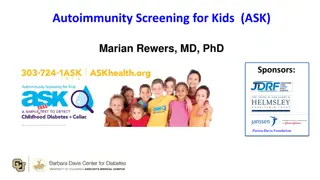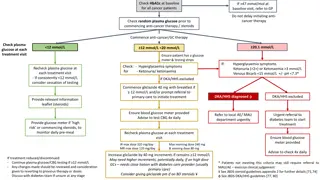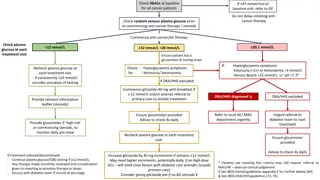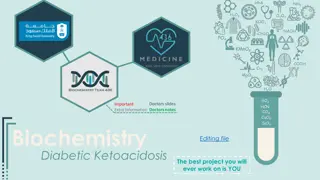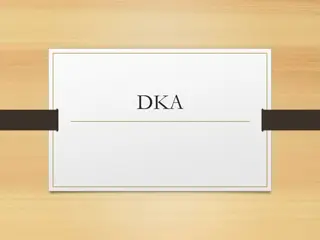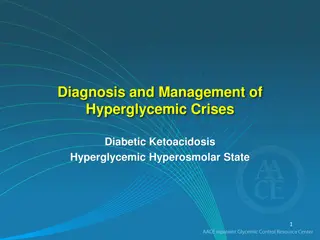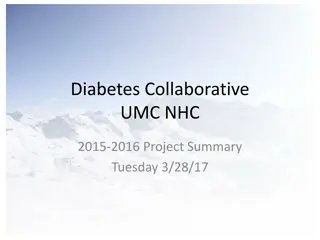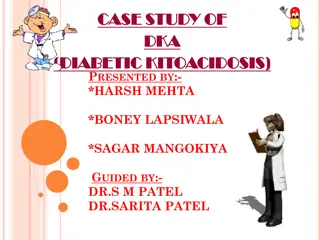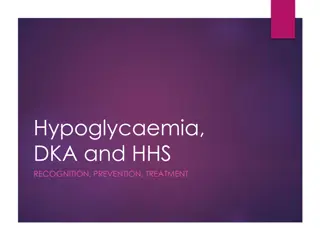Autoimmunity Screening for Kids (ASK) Study Findings in Colorado Population
Autoimmunity Screening for Kids (ASK) conducted a study in Colorado on over 30,000 children aged 1-17, revealing a 1.0% prevalence of pre-symptomatic Type 1 Diabetes (T1D) and a 2.1% prevalence of celiac disease/autoimmunity. The screening showed a significant reduction in Diabetic Ketoacidosis (DKA
1 views • 15 slides
Guidelines for Monitoring Blood Glucose in Cancer Patients Undergoing Anti-Cancer Therapy
Guidelines recommend checking HbA1c and random plasma glucose levels at baseline for all cancer patients before initiating anti-cancer therapy. Regular monitoring of plasma glucose levels during treatment is essential, with specific actions based on glucose readings. Immediate referrals and treatmen
0 views • 4 slides
Guidelines for Managing Hyperglycemia in Cancer Patients Receiving Anti-Cancer Therapy
Cancer patients undergoing anti-cancer therapy need vigilant monitoring for hyperglycemia. Baseline HbA1c and random plasma glucose levels must be checked before initiating therapy. Regular glucose monitoring, symptom assessment, and ketone testing are crucial throughout treatment. Prompt referrals,
0 views • 4 slides
Update on Diabetic Ketoacidosis (DKA) Guidelines by UHB and JBDS
There has been a recent update in the Diabetic Ketoacidosis (DKA) guidelines by UHB and JBDS. The new guidelines include reducing the insulin infusion rate to 0.05 units/kg/hr once blood glucose levels reach 14mmol/l. Additionally, alongside a 10% glucose administration of 125ml/hr is recommended to
1 views • 12 slides
Understanding Diabetic Emergencies: DKA, HHS, Hypoglycemia
This lecture focuses on diabetic emergencies such as Diabetic Ketoacidosis (DKA), Hyperosmolar Hyperglycemic State (HHS), and Hypoglycemia. It discusses the definitions, causes, mechanisms, manifestations, and management of these critical conditions. By the end of the session, students will have a c
0 views • 40 slides
DKA Austria Development Cooperation Strategy for Ethiopia 2020-2024
DKA Austria's country strategy for Ethiopia (2020-2024) focuses on regional development, livelihood improvement, and youth employment. The strategy emphasizes continued cooperation in existing regions, enhancing agricultural productivity through agroecology, and reducing youth unemployment through s
0 views • 14 slides
Acute Diabetic Ketoacidosis in a 19-Year-Old Male
Acute presentation of a 19-year-old man with diabetic ketoacidosis (DKA) characterized by hyperglycemia, anion-gap acidosis, and ketosis. Clinical findings include dehydration, hyponatremia, hypotension, altered consciousness, and abdominal pain. Immediate management involves ABCs, fluid resuscitati
0 views • 16 slides
Understanding and Managing Hyperglycemic Crises: DKA and HHS
Hyperglycemic crises such as Diabetic Ketoacidosis (DKA) and Hyperglycemic Hyperosmolar State (HHS) are life-threatening emergencies characterized by severe hyperglycemia and metabolic imbalances. DKA involves absolute or near-absolute insulin deficiency leading to ketone body production and systemi
0 views • 82 slides
Pediatric Diabetic Ketoacidosis: Diagnosis, Management, and Case Studies
Management of pediatric diabetic ketoacidosis (DKA) is crucial to prevent complications such as cerebral edema and hypoglycemia. This content covers the incidence of DKA in children, traditional aims of DKA management, guidance from BSPED, and case studies for practical application. Learn to diagnos
0 views • 38 slides
Diabetes Collaborative Project 2015-2016 Summary
In the Diabetes Collaborative Project 2015-2016, a random sample of 75 diabetic patients' records were queried monthly at each clinic site, with a total sample size of 450 patients reviewed monthly. Outreach activities were conducted based on sample data results. Metric goal variations were observed
0 views • 7 slides
Case Study of Diabetic Ketoacidosis (DKA) in a 5-Year-Old Female Patient
A case study on a 5-year-old female patient admitted with symptoms of pain in the right ear, neck, vomiting, and fever. The patient initially sought treatment for ear pain at another hospital before becoming unconscious and being brought to a civil hospital. Biochemistry results revealed abnormaliti
0 views • 39 slides
Hypoglycaemia, DKA and HHS RECOGNITION, PREVENTION, TREATMENT
Hypoglycaemia is characterized by low blood glucose levels and is common in individuals with Type 1 or Type 2 diabetes on insulin or sulphonylureas. Recognizing risk factors, clinical features, and causes is crucial for timely intervention. Treatment involves quick-acting carbohydrates to normalize
0 views • 21 slides
